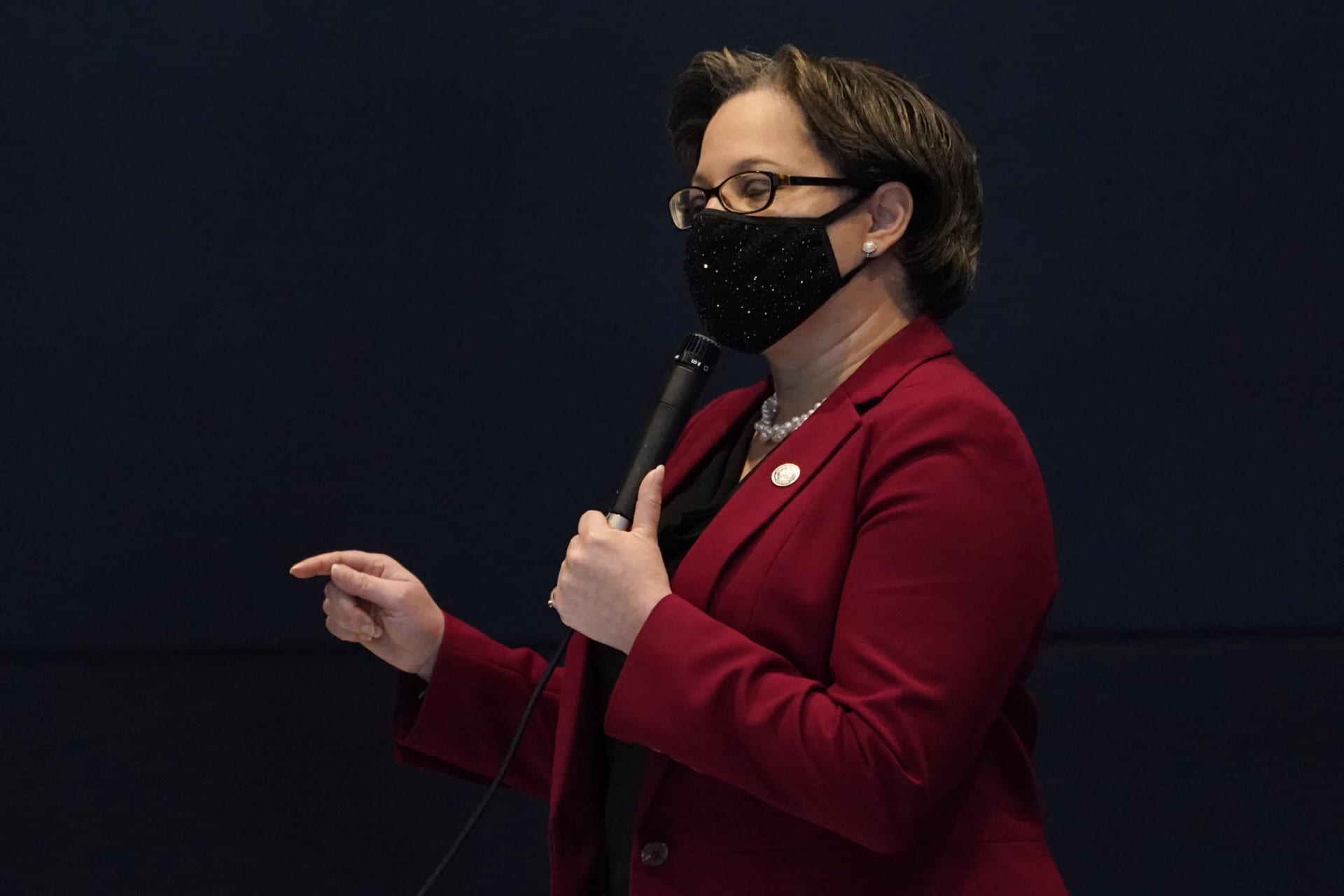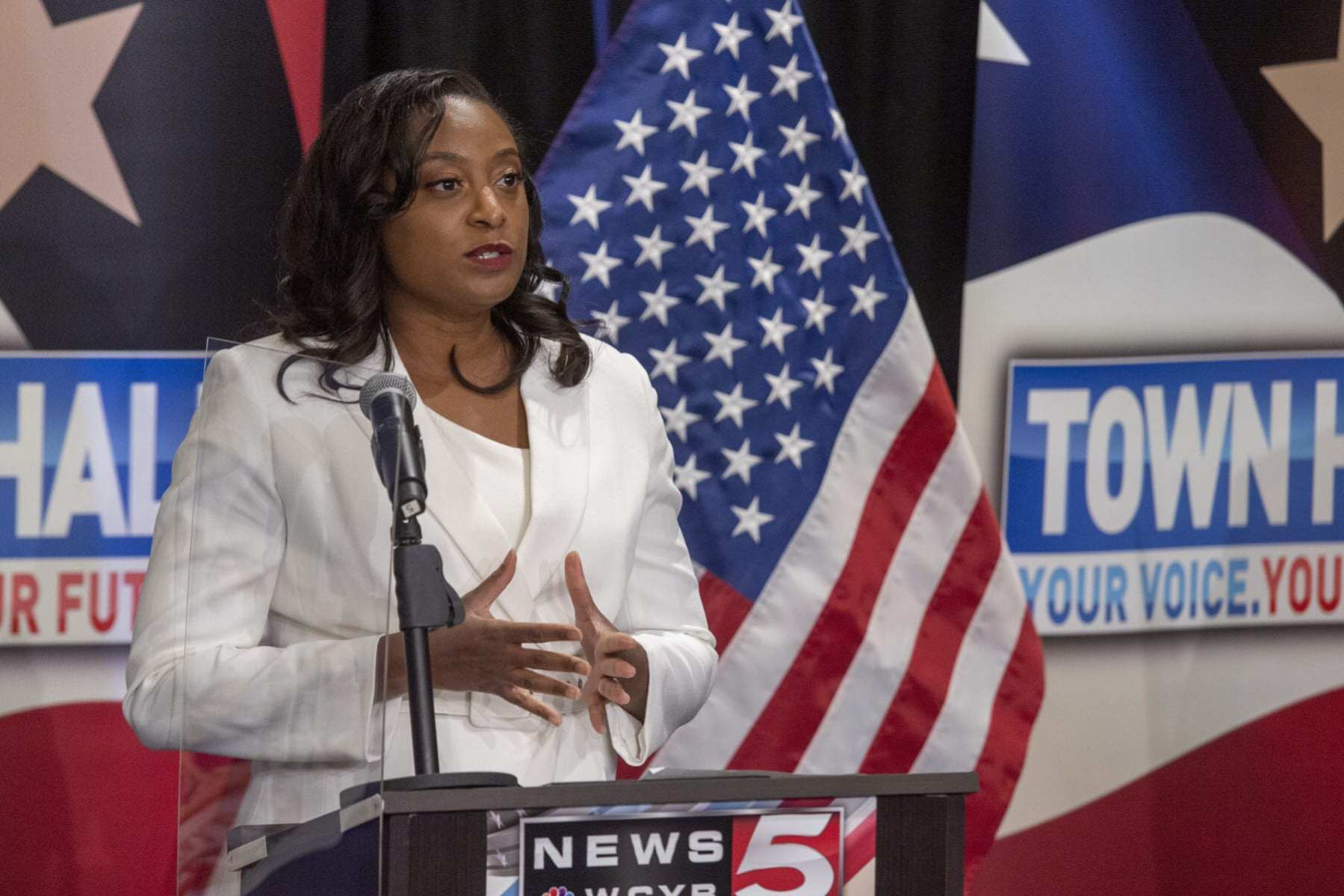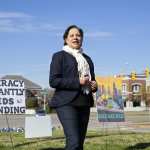For more on this race and results, read The 19th’s latest coverage here.
CHARLOTTESVILLE and RICHMOND, Virginia — With less than a month until Virginia Democrats nominate a gubernatorial candidate, groups that support women and people of color are starting to pick sides after being torn between Jennifer Carroll Foy and Jennifer McClellan.
Carroll Foy, a former state delegate, and McClellan, a current state senator, are both vying to be elected the first Black woman governor in the country. But they have thus far struggled to seriously dent support for former Virginia Gov. Terry McAuliffe, a former national party official and longtime adviser to the Clintons who came into the race with a significant war chest. Other contenders include the state’s lieutenant governor and another state delegate.
Carroll Foy, a former public defender, secured a high-profile endorsement Friday from Higher Heights for America, which aims to bolster the political power of Black women. CEO Glynda Carr told The 19th that they waited to endorse in order to “normalize having multiple Black women in a contest like this.” But after they started “weighing what this final stretch would look like … we thought it was important to engage and endorse Jennifer Carroll Foy,” she said.
“There’s a movement building in this final stretch” ahead of Virginia’s June 8 Democratic primary, Carr said.
“We did not take this decision lightly and were very deliberate about the way we’ve moved and thought,” she added.
Earlier in the week, Carroll Foy secured the backing of the well-known feminist activist Gloria Steinhem, and the NAKASEC Action Fund, which works to elect candidates whose policies support Asian Americans, particularly those who are low-income individuals or are recent immigrants.
Carroll Foy in late April secured one of the most sought-after endorsements in Democratic politics, from EMILY’s List, which backs Democratic women who support abortion access. Spokesperson Kristen Hernandez said the group knew it needed to counter McAuliffe’s dominating effect by making an endorsement. But, having worked with both Carroll Foy and McClellan before, they wanted to be “especially thoughtful” in choosing whom to support.
One factor was Carroll Foy’s ability to take on McAuliffe’s fundraising prowess. Virginia’s governors cannot seek consecutive terms, so when McAuliffe entered the race in December it was essentially as its incumbent candidate and therefore front-runner. The business-friendly centrist has raised nearly $12 million over the course of his campaign.
“We put a lot of thought into this endorsement, when there are two, strong, pro-choice Democratic women in a race, that’s a good problem to have,” Hernandez said.
Current members of Virginia’s General Assembly cannot accept campaign contributions while the assembly is in session. Carroll Foy’s decision to resign her state delegate post in December to focus on her gubernatorial campaign has enabled her to raise nearly $4 million. Two weeks ago, her campaign made a six-figure ad buy in Northern Virginia — an expensive media market near Washington, D.C., where a critical mass of the state’s Democratic voters are based. McClellan, who remains a state senator, was not able to raise money until after the General Assembly adjourned in February. The other two candidates in the race, current Lt. Gov. Justin Fairfax and state delegate Lee Carter, were likewise conscribed.
McAuliffe has snagged endorsements from Eileen Filler-Corn, the first woman speaker of the Virginia House of Delegates and state Sen. Louise Lucas, the first Black woman to serve as president pro tempore of the Virginia Senate, co-chairs his campaign. McClellan is backed by Leslie Byrne, the first woman Virginia elected to the U.S. House, along with dozens of local and state leaders and groups such as the Women of Color Coalition. Carroll Foy is supported by national groups such as the Working Families Party and Democracy for America, as well as an array of labor unions. All three are endorsed by individual members of the Virginia Legislative Black Caucus, for which McClellan acts as vice chair, but not the caucus itself.
Both Carroll Foy and McClellan are running as changemakers who would challenge the state’s status quo on multiple fronts. Virginia lags many other states when it comes to electing women to statewide office: It is one of the 20 states that have not elected a woman governor and one of seven that have not elected a woman to the lieutenant governor position. Virginia has also never elected a woman to the U.S. Senate.
Nationally, the closest a Black woman has gotten to occupying a governor’s mansion was Georgia’s Stacey Abrams in 2018. She lost narrowly to Republican Brian Kemp in the closest gubernatorial race in the state since the 1960s. After her loss, Abrams founded Fair Fight, a group that worked to elect Democrats in 2020 and push back against voter suppression. Her work, along with that of other Black women activists, is thought to be a major factor in Georgia’s election of two Democratic U.S. senators and backing Democratic President Joe Biden.
Carroll Foy told supporters during a recent campaign stop in Charlottesville that she had been told it would be hard to overcome a candidate like McAuliffe, who has amassed power in the state over decades in Democratic politics. She pointed out she was one of the first women to graduate from the Virginia Military Institute. She ran for the state house while she was pregnant with twins. In a recent debate, she challenged McAuliffe on race and policing, saying he had stood by problematic officers. “I am not here to ask the patriarchy for permission,” she told her supporters. “I will not wait my time and I will damn well never wait for permission.”
“Now is our time, now is our turn … now is the time for a working mom to represent working families,” Carroll Foy told the crowd.
“That’s right, girl!” a supporter shouted.

The next day, in Richmond, the state’s capital, McClellan spoke at length to a largely Latinx audience about her family. Her mother, she said, was one of 14 kids, born during the Great Depression in the segregated U.S. South. “Nearly every woman in her family, including her for a while, was a domestic worker,” McClellan said, noting her own work ushering a domestic workers bill of rights through the General Assembly.
McClellan said that her great grandparents had to take literacy tests in order to vote, her grandparents paid poll taxes, and her parents came of age during the Civil Rights Movement that dismantled those practices. “I’m the first generation of my family to be able to vote” without such barriers, she said.
“I’m running for governor because I’m tired of fighting the same fights as my parents, my grandparents, my great-grandparents,” she said, “I will not leave those fights for my children or yours.”
Just two years ago, Virginia Democrats seemed poised to nominate a woman, a candidate of color, or both, to run for statewide executive positions in response to calls for the governor, lieutenant governor and attorney general to resign over race- or assault-related scandals.
First, a racist photo surfaced from Gov. Ralph Northam’s page in his medical school yearbook. He first said he was in the photo, which showed one person in blackface and another in a Ku Klux Klan robe, and apologized, but later said it was not him. Then two women made sexual assault accusations against Fairfax, which he has denied but are still unresolved. State Attorney General Mark Herring said he wore blackface in college at a costume party and apologized.
McAuliffe called for Northam to resign then said he regretted doing so. He called for Fairfax to resign and Fairfax said that he was racist for doing so. Northam in April endorsed McAuliffe’s bid to replace him.
The Republicans’ nomination this week of Glenn Youngkin as their gubernatorial candidate and Winsome Sears as their contender for lieutenant bolsters the case for Democrats nominating McClellan or Carroll Foy instead of McAuliffe, some in the party said.
Youngkin is a wealthy businessman and political outsider who emerged from a chaotic nominating process in which former President Donald Trump remained neutral until after its conclusion. He will need to differentiate between his own profile and Trump’s if he wants to win in a state that has not sent a Republican to statewide office since 2009.
The Democratic nominee will then need to draw a contrast between themself and Youngkin. Youngkin, a White man, is running for the governor’s mansion as a former global investment firm executive with a business-friendly pitch. More than one Democrat drew a connection to McAuliffe’s previous runs and his background as a former bank executive and investor with a business-friendly pitch. Sears, a former Marine and gun-rights-supporting immigrant from Jamaica, would be the first Black woman elected to statewide office in Virginia.
There are six contenders to be the Democratic nominee for lieutenant governor. The front runner is thought to be state Del. Hala Ayala. Ayala identifies as Afro-Latina, Lebanese and Irish, and would also be the first Latinx person to hold statewide office.
“I would hate to see the Republican Party have a ticket that is more diverse than the Democratic Party. That would be a crying shame,” said Susan Platt, a 2017 candidate in Virginia’s Democratic primary for lieutenant governor.
The dearth of women running for, and winning, statewide office in Virginia prompted Platt to start Her Excellency — in Virginia, a governor’s honorific is “his excellency” — which aims to elect women to the state’s highest office. The group has not officially endorsed in the gubernatorial primary, but Platt personally supports McClellan.
“And frankly, I think a capable woman up against Glenn Youngkin would have a better chance of motivating the electorate,” Platt added.
Carroll Foy described in an interview how in her 2017 race for the House of Delegates, two years before Democrats took control of the state legislature for the first time in more than 20 years, she was “being outraised four-to-one, and my [primary] opponent [had] every endorsement imaginable.”
“None of those things mattered. Because I know that everything is impossible until it’s done. If there is going to be a trail, there has to be someone who is willing to blaze it,” Carroll Foy said.
“And at the end of the day, one of the reasons we have never had a Black woman to lead this country is because the social structures and systems in place aren’t made for us, and so we’ll never be next in line, or next up. We can’t wait for someone to give us permission to lead, we have to take it,” she added.
Polls as of late April showed McAuliffe with a commanding lead. In one done by Christopher Newport University’s Watson Center, 47 percent of likely Democratic primary voters favored McAuliffe, with McClellan receiving 6 percent and Carroll Foy just 5 percent. Both Carroll Foy and McClellan told The 19th they did not believe the race was baked. As of May 12, only about 31,000 ballots had been cast during early voting. About 540,000 Democrats voted in the 2017 gubernatorial primary.
Carroll Foy’s campaign predicted in February, based on internal polling, that McAuliffe would fare well in early public polls due to higher level of statewide name recognition but that the gap would close as the candidates participated in debates and their campaign bought air time. The slow start in early voting could also suggest a lack of enthusiasm for McAuliffe and mean voters are keeping their options open, supporters of both Carroll Foy and McClellan suggested.
“The poll I’m paying attention to is the nearly 100,000 conversations that we have had in the community, not the 600 to 800 people the pollsters are talking to,” McClellan told The 19th as she went door-knocking in Richmond.
McClellan said that in her campaign’s conversations with likely voters, about 52 percent say they support her, or will at least consider it, and that another 30 percent are still undecided.
“A lot of people aren’t paying attention yet — but they’re starting to,” she added.






